|
Mountain - "Climbing!" (Bell 1970)
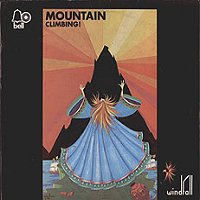 Mountain was one of the more interesting hard rock acts to come from America in the '70s. The combination of guitarist Leslie West's heavy riffs and the melodic sensibilities of bassist and producer Felix Pappalardi was a formula that resulted in a couple of classic albums and a few years of great success for the band. They couldn't have delivered a much better debut than "Climbing!" as the album featured many of their best-known classics, as well as showcasing all the different sides of the band. "Never in my Life", "Sittin' on a Rainbow" and their signature-tune "Mississippi Queen" are all in-your-face heavy rock assaults that rocked just as hard and loud as any of the British hard rock bands of the same era (actually not all that common for American hard rock bands in those times). The perhaps best example of the other side of the band is their version of Jack Bruce' "Theme for an Imaginary Western". This is undoubtedly the best and most loved version of this beautifully melodic tune. Steve Knight's organ gives the tune the majestic lift and atmosphere it deserves. "For Yasgur's Farm" is the definitive combination of both sides of the band, and is Mountain's style in a nutshell, based around one of the best melodies they ever wrote. "Silver Paper" is an irresistible catchy and whimsical song, and "To My Friend" allows West to showcase his skills on acoustic guitar. Pappalardi's past as the producer and, on some occasions, songwriter for Cream comes to the surface on "Boys in the Band". "Climbing!" is an exceptionally strong and consistent debut, and should be the first or second album by Mountain you'll check out. Mountain was one of the more interesting hard rock acts to come from America in the '70s. The combination of guitarist Leslie West's heavy riffs and the melodic sensibilities of bassist and producer Felix Pappalardi was a formula that resulted in a couple of classic albums and a few years of great success for the band. They couldn't have delivered a much better debut than "Climbing!" as the album featured many of their best-known classics, as well as showcasing all the different sides of the band. "Never in my Life", "Sittin' on a Rainbow" and their signature-tune "Mississippi Queen" are all in-your-face heavy rock assaults that rocked just as hard and loud as any of the British hard rock bands of the same era (actually not all that common for American hard rock bands in those times). The perhaps best example of the other side of the band is their version of Jack Bruce' "Theme for an Imaginary Western". This is undoubtedly the best and most loved version of this beautifully melodic tune. Steve Knight's organ gives the tune the majestic lift and atmosphere it deserves. "For Yasgur's Farm" is the definitive combination of both sides of the band, and is Mountain's style in a nutshell, based around one of the best melodies they ever wrote. "Silver Paper" is an irresistible catchy and whimsical song, and "To My Friend" allows West to showcase his skills on acoustic guitar. Pappalardi's past as the producer and, on some occasions, songwriter for Cream comes to the surface on "Boys in the Band". "Climbing!" is an exceptionally strong and consistent debut, and should be the first or second album by Mountain you'll check out.
Mountain - "Nantucket Sleighride" (Island 1971)
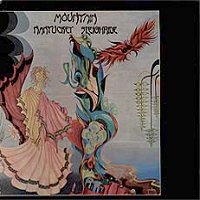 This one is usually regarded as the definitive Mountain album. It featured the legendary title-track that very well could be the best song the band ever wrote. The track covered everything that classic Mountain stood for: melodic vocals, powerful riffs and a very well written instrumental part in the middle. But there are lots of other gems here too. "Don't look around" opened the album with an ear shattering roar, and "You Can't Get Away" swings and rocks like a hurricane. "Tired Angels" had the same variation between melodic parts and heavy riffs as "For Yasgur's Farm" from the debut, but in reverse order. "My Lady" is an irresistible cute and charming love song, and "Travelin' in the Dark" had a beautiful guitar theme. "The Great Train Robbery" and the single "The Animal Trainer and the Toad" was a step closer to basic blues-rock, but still enjoyable. And let's not forget the short and atmospheric instrumental "Taunta (Sammy's Tune)". This album is a classic of early '70s American hard rock, and is next to "Climbing!" the most essential release from Mountain. This one is usually regarded as the definitive Mountain album. It featured the legendary title-track that very well could be the best song the band ever wrote. The track covered everything that classic Mountain stood for: melodic vocals, powerful riffs and a very well written instrumental part in the middle. But there are lots of other gems here too. "Don't look around" opened the album with an ear shattering roar, and "You Can't Get Away" swings and rocks like a hurricane. "Tired Angels" had the same variation between melodic parts and heavy riffs as "For Yasgur's Farm" from the debut, but in reverse order. "My Lady" is an irresistible cute and charming love song, and "Travelin' in the Dark" had a beautiful guitar theme. "The Great Train Robbery" and the single "The Animal Trainer and the Toad" was a step closer to basic blues-rock, but still enjoyable. And let's not forget the short and atmospheric instrumental "Taunta (Sammy's Tune)". This album is a classic of early '70s American hard rock, and is next to "Climbing!" the most essential release from Mountain.
Mountain - "Flowers of Evil" (Island 1971)
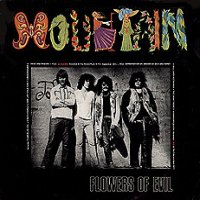 Mountain had got a great reputation as a live-act, so the whole second side of their third album "Flowers of Evil" was taken up by a live performance from the Fillmore East. Most of it consisted of the 25-minute "Dream Sequence". This intense and outstanding jam showed the band in top shape on stage. Here's lots of lengthy solos and catchy riffs, everything played with an inspiration, energy and enthusiasm that Mountain unfortunately not would show much of after the next album. They also threw in some old rock'n'roll classics ("Roll over Beethoven" and "Milk and Honey") between all the jamming, creating a great and lengthy piece of powerful, early '70s hard rock at its best and in its right environment. The rest of the side was taken up by a good version of "Mississippi Queen" where they also played a few chords from Cream's "Politician". The studio side was less convincing, as it featured some mediocre material and also tendencies of recycling ideas from the two first albums. The title-track is a generic tune that lacks the outstanding riffs and melodies that characterized Mountain at their best. "King's Chorale" is a carbon copy of "Taunta (Sammy's Tune)" from the previous album. "One Last Cold Kiss" is a lot better, and one of the riffs was taken from "Dream Sequence". But the only classic song here is "Crossroader" that featured one of Mountain's best riffs. The psychedelic/progressive experiment "Pride and Passion" is decent enough, but NO "Nantucket Sleighride". Despite some flaws, the album is worth having for the live side and "Crossroader", and it will be a natural purchase if you want more after "Climbing!" and "Nantucket Sleighride". Mountain had got a great reputation as a live-act, so the whole second side of their third album "Flowers of Evil" was taken up by a live performance from the Fillmore East. Most of it consisted of the 25-minute "Dream Sequence". This intense and outstanding jam showed the band in top shape on stage. Here's lots of lengthy solos and catchy riffs, everything played with an inspiration, energy and enthusiasm that Mountain unfortunately not would show much of after the next album. They also threw in some old rock'n'roll classics ("Roll over Beethoven" and "Milk and Honey") between all the jamming, creating a great and lengthy piece of powerful, early '70s hard rock at its best and in its right environment. The rest of the side was taken up by a good version of "Mississippi Queen" where they also played a few chords from Cream's "Politician". The studio side was less convincing, as it featured some mediocre material and also tendencies of recycling ideas from the two first albums. The title-track is a generic tune that lacks the outstanding riffs and melodies that characterized Mountain at their best. "King's Chorale" is a carbon copy of "Taunta (Sammy's Tune)" from the previous album. "One Last Cold Kiss" is a lot better, and one of the riffs was taken from "Dream Sequence". But the only classic song here is "Crossroader" that featured one of Mountain's best riffs. The psychedelic/progressive experiment "Pride and Passion" is decent enough, but NO "Nantucket Sleighride". Despite some flaws, the album is worth having for the live side and "Crossroader", and it will be a natural purchase if you want more after "Climbing!" and "Nantucket Sleighride".
Mountain - "Live (The Road goes ever on)" (Island 1972)
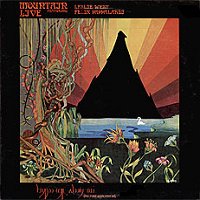 This live-album turned out to be the last release from the classic line-up, but it was a very worthy farewell. The performances have the same intensity and quality as the live side of "Flowers of Evil". It kicks of with a slow and heavy tune called "Long Red" that was taken from Leslie West's solo-album "Mountain" from 1969 (yes, that's where they got their name from). "Waiting to Take you Away" is another strong tune, and to my knowledge nowhere else to be found than on this album. The version of "Crossroader" is raw and powerful, just the way it was meant on stage. The whole second side was taken up by a 17-minute version of "Nantucket Sleighride". Again, the pure intensity and energy of the band will leave the listener breathless. THIS is the way all bands should be live. By the way, live was also the best way to hear Pappalardi's legendary and ultra heavy bass sound. He improvises a lot around some beautiful chords and melodies here, and is often just as dominant in the sound as West's guitar. "Live (The Road goes ever on)" is next to the live side of "Flowers of Evil" the best document of Mountain on stage. This live-album turned out to be the last release from the classic line-up, but it was a very worthy farewell. The performances have the same intensity and quality as the live side of "Flowers of Evil". It kicks of with a slow and heavy tune called "Long Red" that was taken from Leslie West's solo-album "Mountain" from 1969 (yes, that's where they got their name from). "Waiting to Take you Away" is another strong tune, and to my knowledge nowhere else to be found than on this album. The version of "Crossroader" is raw and powerful, just the way it was meant on stage. The whole second side was taken up by a 17-minute version of "Nantucket Sleighride". Again, the pure intensity and energy of the band will leave the listener breathless. THIS is the way all bands should be live. By the way, live was also the best way to hear Pappalardi's legendary and ultra heavy bass sound. He improvises a lot around some beautiful chords and melodies here, and is often just as dominant in the sound as West's guitar. "Live (The Road goes ever on)" is next to the live side of "Flowers of Evil" the best document of Mountain on stage.
Mountain - "Twin Peaks" (CBS 1974)
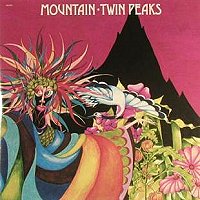 Mountain broke up for the first time after "Live (The Road goes ever on)" and the members went on to pursue several projects on their own. All of them flopped, so it was no surprise that West and Pappalardi joined forces again. But they were the only remaining members from the first line-up, as neither Laing nor Knight wanted to continue. Robert Mann and Allen Schwarzberg replaced them, and the band immediately went out on a tour. The first release from this new version of Mountain then became the double live-album "Twin Peaks". It didn't do much else than prove how inferior the new line-up was compared to the old band. Sure, they played loud and heavy as hell, but at the same time also sloppy and uninspired. The album became notoriously known for its over-extended version of "Nantucket Sleighride" that took up no less than two whole sides of the record! While the version on "Live (The Road goes ever on)" had been an intense firework and a demonstration of how a great live-jam should be done, this one was just a never-ending, noodling bore with no other function than curing the listener from insomnia. The other songs are at least of a more moderate length, but not performed much better. "Never in my Life", "Theme from an Imaginary Western", "Crossroader" and "Mississippi Queen" are of course all Mountain classics, but much better in their original studio versions. The album also included another track from West's solo album "Mountain" and a guitar solo that sounded like a weak attempt at re-creating something from "Dream Sequence". Mountain broke up for the first time after "Live (The Road goes ever on)" and the members went on to pursue several projects on their own. All of them flopped, so it was no surprise that West and Pappalardi joined forces again. But they were the only remaining members from the first line-up, as neither Laing nor Knight wanted to continue. Robert Mann and Allen Schwarzberg replaced them, and the band immediately went out on a tour. The first release from this new version of Mountain then became the double live-album "Twin Peaks". It didn't do much else than prove how inferior the new line-up was compared to the old band. Sure, they played loud and heavy as hell, but at the same time also sloppy and uninspired. The album became notoriously known for its over-extended version of "Nantucket Sleighride" that took up no less than two whole sides of the record! While the version on "Live (The Road goes ever on)" had been an intense firework and a demonstration of how a great live-jam should be done, this one was just a never-ending, noodling bore with no other function than curing the listener from insomnia. The other songs are at least of a more moderate length, but not performed much better. "Never in my Life", "Theme from an Imaginary Western", "Crossroader" and "Mississippi Queen" are of course all Mountain classics, but much better in their original studio versions. The album also included another track from West's solo album "Mountain" and a guitar solo that sounded like a weak attempt at re-creating something from "Dream Sequence".
Mountain - "Avalanche" (CBS 1975)
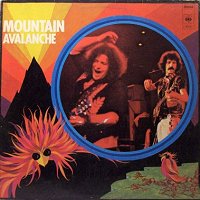 "Avalanche" was Mountain's first full studio album since "Nantucket Sleighride" and it also brought Corky Laing back in the band again. But the record was too uneven to rank up with the band's finest releases. The best tracks here were probably "Sister Justice", "Swamp Boy" and "Thumbsucker". All of them were gutsy hard rockers sung by Pappalardi. The version of "Whole Lotta Shakin' Goin' on" was also a fine rockin' piece. "Alisan" is structurally a clone of "To My Friend" from the debut, but forgivable as the melodies are actually stronger in this tune. The rest of the album consists mainly of filler. The slow and awkward version of The Rolling Stones' "(I can't get no) Satisfaction" is definitively different, but I'm more doubtful about how good it is. "You Better Believe it" is mediocre Mountain that really never takes off, and the three last songs on the album are all completely disposable. The band broke up again after this album. Pappalardi was tragically murdered by his own wife Gail Collins (who co-wrote several of the band's songs, and also designed the colourful sleeves) in 1983, but it didn't stop West from doing lots of pathetic "reunions" of the band during the 80's and 90's. Stick with the first four albums, and skip the rest. "Avalanche" was Mountain's first full studio album since "Nantucket Sleighride" and it also brought Corky Laing back in the band again. But the record was too uneven to rank up with the band's finest releases. The best tracks here were probably "Sister Justice", "Swamp Boy" and "Thumbsucker". All of them were gutsy hard rockers sung by Pappalardi. The version of "Whole Lotta Shakin' Goin' on" was also a fine rockin' piece. "Alisan" is structurally a clone of "To My Friend" from the debut, but forgivable as the melodies are actually stronger in this tune. The rest of the album consists mainly of filler. The slow and awkward version of The Rolling Stones' "(I can't get no) Satisfaction" is definitively different, but I'm more doubtful about how good it is. "You Better Believe it" is mediocre Mountain that really never takes off, and the three last songs on the album are all completely disposable. The band broke up again after this album. Pappalardi was tragically murdered by his own wife Gail Collins (who co-wrote several of the band's songs, and also designed the colourful sleeves) in 1983, but it didn't stop West from doing lots of pathetic "reunions" of the band during the 80's and 90's. Stick with the first four albums, and skip the rest.

|